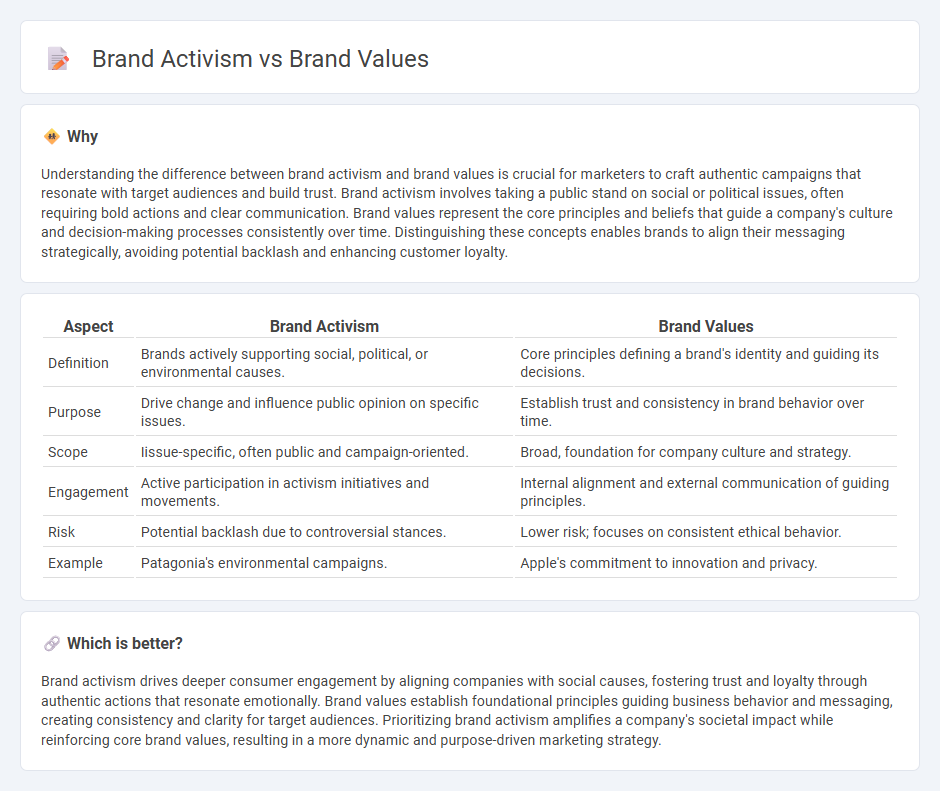
Brand activism focuses on companies taking a public stand on social and political issues, demonstrating commitment beyond traditional marketing efforts. Brand values define a company's core principles and beliefs that guide its long-term behavior and decision-making processes. Explore how aligning brand activism with authentic brand values can strengthen customer trust and loyalty.
Why it is important
Understanding the difference between brand activism and brand values is crucial for marketers to craft authentic campaigns that resonate with target audiences and build trust. Brand activism involves taking a public stand on social or political issues, often requiring bold actions and clear communication. Brand values represent the core principles and beliefs that guide a company's culture and decision-making processes consistently over time. Distinguishing these concepts enables brands to align their messaging strategically, avoiding potential backlash and enhancing customer loyalty.
Comparison Table
| Aspect | Brand Activism | Brand Values |
|---|---|---|
| Definition | Brands actively supporting social, political, or environmental causes. | Core principles defining a brand's identity and guiding its decisions. |
| Purpose | Drive change and influence public opinion on specific issues. | Establish trust and consistency in brand behavior over time. |
| Scope | Iissue-specific, often public and campaign-oriented. | Broad, foundation for company culture and strategy. |
| Engagement | Active participation in activism initiatives and movements. | Internal alignment and external communication of guiding principles. |
| Risk | Potential backlash due to controversial stances. | Lower risk; focuses on consistent ethical behavior. |
| Example | Patagonia's environmental campaigns. | Apple's commitment to innovation and privacy. |
Which is better?
Brand activism drives deeper consumer engagement by aligning companies with social causes, fostering trust and loyalty through authentic actions that resonate emotionally. Brand values establish foundational principles guiding business behavior and messaging, creating consistency and clarity for target audiences. Prioritizing brand activism amplifies a company's societal impact while reinforcing core brand values, resulting in a more dynamic and purpose-driven marketing strategy.
Connection
Brand activism deeply intertwines with brand values as companies leverage their core principles to advocate for social, environmental, or political causes that resonate with their audience. Authentic alignment between brand activism and intrinsic brand values enhances consumer trust, fosters loyalty, and differentiates the brand in competitive markets. This strategic connection drives meaningful engagement and reinforces the brand's identity within evolving cultural conversations.
Key Terms
Purpose
Brand values represent the core principles that define a company's identity and guide its behavior, while brand activism involves actively championing social or environmental causes aligned with those values to drive change. Purpose-driven brands leverage both to build deeper connections with consumers who share their commitment to meaningful impact. Discover how integrating brand values with activism can amplify your brand's influence and foster loyalty.
Social Responsibility
Brand values represent a company's core principles guiding its actions and decisions, embedding social responsibility into its identity. Brand activism takes this further by actively promoting social causes and engaging in public advocacy to drive societal change. Explore how businesses balance brand values and activism to foster genuine social responsibility and impact.
Consumer Perception
Brand values define a company's core principles and ethical standards that guide its business practices, shaping consumer trust and loyalty. Brand activism involves publicly taking a stance on social or political issues, directly influencing consumer perception by demonstrating commitment or risking alienation. Explore how aligning brand values with activism strategies can enhance or challenge consumer relationships.
Source and External Links
Brand Values: Definition, Examples & How to Define Them - Brand values are the fundamental beliefs a company--and its team--stand for in operations, industry, and community, shaping the brand's culture, vision, and mission through consistent application over time.
What Are Brand Values? Definition, Examples and Why They Matter - Brand values are a set of beliefs presented to customers that influence leadership decisions, organizational culture, and brand identity to build a positive reputation and connection with audiences.
What Are Brand Values? A Definition and Complete Guide (2024) - Brand values are key principles guiding company operations, including sourcing, delivery, and employee treatment, representing the core ethics a company upholds consistently to define how it shows itself to the world.
 dowidth.com
dowidth.com